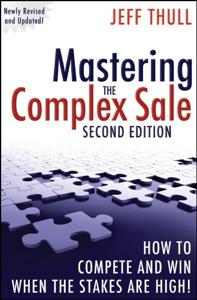
Want to learn the ideas in Mastering the Complex Sale better than ever? Read the world’s #1 book summary of Mastering the Complex Sale by Jeff Thull here.
Read a brief 1-Page Summary or watch video summaries curated by our expert team. Note: this book guide is not affiliated with or endorsed by the publisher or author, and we always encourage you to purchase and read the full book.
Video Summaries of Mastering the Complex Sale
We’ve scoured the Internet for the very best videos on Mastering the Complex Sale, from high-quality videos summaries to interviews or commentary by Jeff Thull.
1-Page Summary of Mastering the Complex Sale
Selling: The Eras
Within the past 50 to 60 years, selling has gone through three eras: * The script era – During the 1950s, salespeople worked on manipulation techniques to convince customers of their products. Sales training focused on making a case for your product and parrying customer objections until closing the deal. This approach is virtually extinct in today’s marketplace.
In the 1970s, sales training materials began to emphasize listening and building a relationship with customers. Instead of being manipulative persuaders, salespeople became problem-solvers. This approach laid the foundation for contemporary selling strategy. However, this method is no longer differentiating because many people practice it now. Moreover, its emphasis on asking questions implicitly assumes that customers know what they need when sometimes they don’t.
The consultant era – In our contemporary times, sales representatives bring customers business ideas and solutions that they would never have thought of without help. Salespeople solve problems both for their employers and the customer. They think in terms of cost-benefit for the employer and customer.
Change with the Changing World
There’s a lot of competition nowadays, and it’s getting harder to differentiate your product or service. Companies are trying to compete by offering complex products, which makes the market even more complicated for customers. The good news is that excellent salespeople will be needed in the future because they’ll need to explain these complex products and services. The bad news is that even though you can offer complex solutions, all products eventually become commodities no matter how great they are.
Complex sales have several common characteristics. First, the customer is generally a business (B2B) or a government entity (B2G). The sales usually involve multiple people and geographies, as well as require significant investments from both parties. For example, Lockheed Martin’s $200 billion defense contract was won after years of negotiation with many different countries’ air forces. Perhaps these types of complex sales are immune to commoditization – perhaps not. But in other industries, such as technology and healthcare, commoditization continues to pressure businesses.
Computers used to be complex and expensive. They required a lot of expertise, so they were sold by experts with big sales forces. However, as technology advanced and computers became more common in everyday life, they became commodities that are now sold online by manufacturers who allow customers to configure their own systems for the best price.
Businesses are becoming more complex. Customers and suppliers have a lot of demands, but they don’t want to pay much for them. Businesses need to find ways to work around these problems in order to survive the competition that is increasing every day. Most salespeople aren’t used to dealing with this complexity, so they stick with their old “script” methods, which just doesn’t work anymore. The best way forward is by avoiding three traps:
- The trap of assumption – Conventional approaches assume that the salesperson can learn the customer’s objectives, priorities, needs, criteria and so on by asking. This assumes further that the customer has a good, sound decision-making process. That may be far from true. Customers may not be able to analyze, evaluate and compare features and benefits on complex products and services they purchase infrequently. Some customers may have a good decision making process but many do not have one at all or are incapable of using it properly when purchasing something like a car for example.





